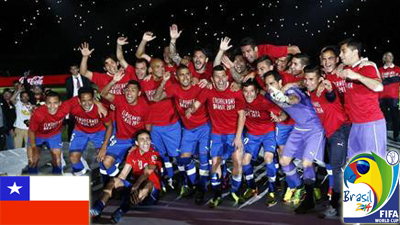Team: Chile
Ranking: 13
Nickname: La Roja
En route to securing their eighth World Cup participation in this year’s Brazil World Cup, Chile had to endure a three-match defeat that saw former coach, Argentine Claudio Borghi, being sacked.
His successor, Jorge Sampaoli, steered the team to a five-victory streak, their best ever run of results in World Cup qualifiers.
The result ensured the team’s first-ever second successive qualification. In what could be deemed Chile’s best qualification story thus far, they scored 29 goals, the second highest in this year’s World Cup qualification stages.
FIFA World Cup history
1962: Their best World Cup performance by far, as host nation, Chile finished third.
On five occasions, Chile has failed to progress from the group stages.
1998 and 2010: Chile only managed to reach the Round of 16, earning an exit on both counts courtesy of Brazil.
Key players: Alexis Sanchez, Arturo Vidal and Eduardo Vargas
Coach: Jorge Sampaoli
By steering Chile to the World Cup, Sampaoli achieved the seemingly impossible: making former coach Marcelo Bielsa’s name recede in the collective public memory.
Bielsa was ranked by polls as the best coach in Chile’s football history.
Sampaoli has coached clubs in Argentina and Peru.
His stint has instilled national pride in a team that had problems with player discipline, turned Chile into a powerful rival with an enviable record.
Under Sampaoli’s guidance, Chile finished third in South American qualifying, drew with Spain and beat England in friendlies, and lost only two of its 15 games last year.

Country profile
Chile is one of the successful countries in South America. It is the largest copper producer and the country’s economy is dependent on exporting minerals. Agriculture is the second economic driver in the country accounting to 6% of the national wealth. Other economic activities include fishing and lumbering. The country processes raw materials and manufactures different consumer goods.
In April 2014 the country was hit by an 8.2 magnitude earthquake; however the damage was not too extensive. More than 2 million people were affected and over 200 died when an earthquake hit Chile in 2010. The economy has since recovered and is the fastest growing in South America.
The country has a low unemployment rate at 6.45% in March 2014. The country is also seeing an increase in the number of women entering the corporate world. In 2013 it had created 66 000 jobs however analysts criticise the country over a lack of skills in some of the industries such as mining.
The country’ labour market is also in short of accountants, auditors, business administrators, civil engineers and IT specialists among others. Despite the country’s strong economy salaries in the country are low. Another challenge the country faces is inequality. According to a survey conducted by the Organisation for Economic Co-operation and Development Chile has the largest gap between the rich and the poor. This has prompted protests in some parts of the country with the poor asking for fairness.
The President Sebastian Pinera launched the “Chile, Developed Country: More opportunities and Better Jobs” programme which aims to make Chile’s economy stronger by 2020.
• Full name: Republic of Chile
• Population: 17.4 million (UN, 2012)
• Capital: Santiago
• Area: 756,096 sq km (291,930 sq miles)
• Major language: Spanish
• Major religion: Christianity
• Life expectancy: 76 years (men), 82 years (women) (UN)
• Monetary unit: Chilean peso
• Main exports: Copper, fish, fruit, paper and pulp, chemicals

– By Tshepo Tsheole and Lerato Matlala


